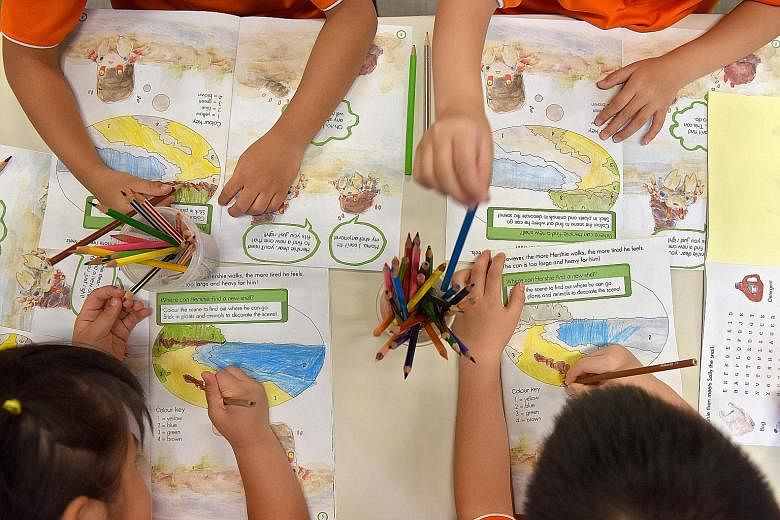Just five years ago, improving pre-school education was a hot- button issue raised in a National Day Rally (NDR).
The issue had come under the spotlight after an Economist Intelligence Unit report ranked Singapore 29th out of 45 countries in standards of early childhood education.
Prime Minister Lee Hsien Loong noted in the NDR that year that there were key operators and many different private providers, but added: "If you are going to raise standards considerably, it is going to mean more resources, higher costs... And if you are going to do that, without (passing) the costs to parents, the Government has to come in."
And it has, in several ways.
It formed a new government agency, ramped up the number of childcare places, started being an operator and running kindergartens, and enacted a new law - and all in the past four years.
•In 2013, it set up the Early Childhood Development Agency, a move that industry observers said signalled more government attention to pre-school education.
•In 2014, it appointed three more operators under a scheme that helps them set up more centres quickly, including mega centres with three to five times the capacity of those in void decks. The number of childcare places has increased by more than 50 per cent to more than 143,000 places since 2012.
•That year, the Ministry of Education also started running kindergartens, to develop new approaches and best practices in pre-school education. It now runs 15 such centres.
•And in February this year, the Early Childhood Development Centres Bill was passed. It holds childcare centres and kindergartens to higher and more consistent quality standards.
Said PM Lee in his National Day Message this year: "We have been investing in pre-schools, because the early childhood years make a big difference to children not just academically, but for life."
Research shows that children with quality pre-school education are more likely to have stable careers and families, and commit fewer crimes.
Demand for childcare places has also risen as more parents see the importance of pre-school education and more mothers return to work.
PM Lee said the Government would increase the number of pre-school places and the quality of pre-schools, and "upgrade the profession" of pre-school teachers. He will give more details at the National Day Rally today.
Industry observers who Insight spoke to had several things on their wish lists for the sector, such as giving pre-schools in state-owned buildings longer land leases so they need not relocate that often, and having more inclusive pre-schools which admit special needs children.
One common thread was a focus on teachers - how to attract, retain and develop them.
There are about 16,000 pre-school educators, with 4,000 more needed by 2020.
MacPherson MP Tin Pei Ling, who has a two-year-old son and is deputy chairman of the Government Parliamentary Committee for Social and Family Development, says: "With the increased focus on the pre-school sector over the years and the sector expanding, understandably, the manpower needs would increase.
"We need to think about how to reinforce the image that being a pre-school educator is a professional job, so more people would find it attractive to join this sector."
MP Ang Hin Kee (Ang Mo Kio GRC), executive secretary of the Education Services Union, which represents pre-school teachers, agrees. He says: "More parents need to accord teachers the right level of respect. Some people still have the impression that the teachers are highly paid nannies."
Pre-school teachers should also be paid more, he says. The monthly starting pay for a polytechnic graduate with a diploma in early childhood education was $2,250 last year, similar to their peers in business and engineering courses.
But he says that after three to five years, pre-school teachers' salaries tend to rise more slowly. Teachers from smaller centres may have fewer career progression opportunities. He suggests that the authorities find a way to redeploy them. A teacher with a certain specialisation could serve several centres, for instance.
Pre-school operators hope the Government would do more to provide funding support for salaries.
St James' Church Kindergarten senior principal Jacqueline Chung says: "If we want to increase salaries, the money has to come from somewhere. And if we don't want to pass the extra costs to parents, I hope the Government would do more to co-pay the salaries."
Dr Khoo Kim Choo, who founded the Preschool for Multiple Intelligences and has been in the sector for more than 30 years, agrees.
Selected operators get funding support to pay teachers, but this leaves others at a disadvantage, she says. "All pre-school providers are doing a service for Singapore. As long as they satisfy quality standards, they should get the funding support."
Meanwhile, Dr Dora Chen, head of Early Childhood Education With Minor programme at the Singapore University of Social Sciences, suggests that more be done to allow pre-school teachers to go for professional development courses.
"There have been more opportunities in the past few years, but the operational and financial constraints continue to limit participation," she says.
Amid calls for the Government to do more, some experts also suggest it do less, and slow down the sector's expansion.
Dr Khoo says: "It'd be counterproductive if we ramp up the number of places too quickly, but don't have enough quality teachers.
"It's not just about getting more people to join the sector, but getting people with the right attitude and love for children."
Senior human resources executive Adler Sho, 34, who has two children aged two and four, with another due next year, points to the importance of teachers' character and moral values: "As the Government makes the industry more attractive, we hope there are strict criteria to ensure the right people are recruited.
"Children watch and model. Some things are caught, not taught."


